
As faithful readers of Kentucky Sports Radio, you no doubt understand and respect our dedication to the art of proper spelling. Fans may not realize this, but
KSR bloggers are subjected to a rigorous written spelling test before being given our own usernames and passwords (BTI made history by being the first and only applicant to misspell every single Kentucky basketball coach's name- yes, even Smith). With this in mind, I pay close attention to the Scripps National Spelling Bee each year, to both improve my personal vocabulary and to laugh at children as they misspell words with more letters than they have years on earth (could you believe it in 2006 when Finola Hackett tried to spell "weltschmerz" with a "z" at the beginning?! LOL!). Since it's a Thursday night in the off-season and you have nothing better to do, I'd like to present you with a guide to the greatest tradition in American sports.
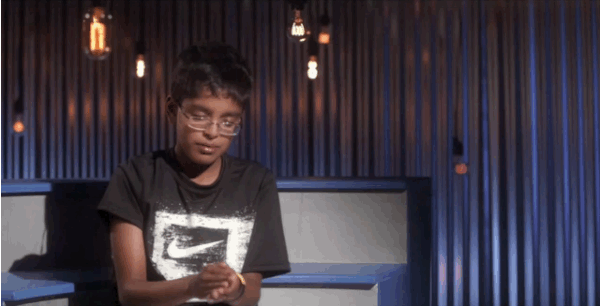 Gokul Venkatachalam, age twelve, imitating LeBron James' pregame routine. Keep your eyes peeled to see if Gokul gets all the calls from the judges tonight as well.
First off, yes, it is a sport.
Gokul Venkatachalam, age twelve, imitating LeBron James' pregame routine. Keep your eyes peeled to see if Gokul gets all the calls from the judges tonight as well.
First off, yes, it is a sport. This much should be obvious, just from the fact that ESPN televises it. Although a spelling bee is right up there with poker, bowling, chess, and cheerleading in terms of athletic ambiguity, the event is covered by the up-and-coming anchors of the Worldwide Leader in Sports. As a matter of fact, Erin Andrews covered the event for a few years, even admitting to a reporter that
she thought the spelling bee could be considered an active sport: "
I guess memorizing and knowing the words and the origin and all that is physical, right? I don't know. I just cover it because they tell me to." A ringing endorsement if I've ever heard one, y'all. She also noted that contestants often pass out from the stress and exertion, which I believe is also inherent when trying to define what is and is not a sport. The contestants spell against a "shot clock" of two minutes and thirty seconds, with the last thirty seconds devoid of any questions from the contestants. Rick Pitino would argue that if you can't do something in thirty seconds, it's not worth doing at all.
As with traditional sports,
the spelling bee also has its own dynasties and blue bloods. This year, Vanya Shivashankar (speller 91) and Ashwin Veeramani (speller 191) both have that championship blood running through their veins; each has a sibling who has previously won the Scripps Spelling Bee. Eighteen spellers total have siblings who have participated in the contest in the past. Similarly, my sister and I once competed in a bellyflop contest off the high dive at Spindletop. She won.
Like any sport worth watching,
the contestants juice up. No, not like Jose Canseco or Lance Armstrong; more like
Buster Bluth in Arrested Development. The high strung East Coast kids go straight Hi-C for the sugar rush to get them through the nerve-wracking rounds, while the West Coast kids prefer the natural route- memory-boosting whey and blueberry concoctions made with their personal Vitamix 1710 Professional Series Blenders. Trust me, if you look under those chairs or backstage at the end of the final round, the scene is positively littered with discarded plastic boxes and biodegradable straws. It ain't pretty, and it's only going to get uglier until Scripps starts to regulate it.
Historically, the bee originated in Louisville in 1925, a compilation of multiple regional spelling bees. Currently located in Washington, DC, the bee is for amateurs only: children under the age of fifteen who have not yet graduated the eighth grade, who have not accepted sponsorship contracts with Nike, Adidas, or Encyclopedia Britannica, and who have not yet won a National Spelling Bee (as
Richmond Bramblet noted, "Snigdha Nandipati now looks silly for her 'not one, not two, not three, not four, not five…' victory speech). Contrary to popular belief, the event is not called a spelling "bee" because the word "bee" was in the past utilized by vindictive judges who enjoyed throwing homonyms at unsuspecting competitors; rather, "bee" refers to a gathering of people participating in a common activity. Used in a sentence, "I will be participating in a drinking bee at some point this weekend."
Dr. Jacques Bailly is the Mark Emmert of the Scripps Spelling Bee. A former winner who trained with nuns to improve his spelling (one rap on the knuckles for each missed word, and a full rosary if he misspelled a word Jesus used in the Bible), Bailly now has a position of utmost importance, what every spelling bee winner aspires to be upon retirement: The Pronouncer. It's like what Bob Costas goes through every two years trying to pronounce various Russian Olympic athletes' names, except if Bailly mispronounces something, he's immediately descended upon by a horde of angry stage parents whacking him with Merriam-Webster dictionaries.
 Jacques as a young victor. A Disney movie in the making.
Kentucky connections?
Jacques as a young victor. A Disney movie in the making.
Kentucky connections? Unfortunately, Emily Keaton of Pikeville lost in this afternoon's semifinals. At fourteen years old, Keaton was making her fifth and final appearance, the Uncle Julius of spelling bees. Since her first competition in 2009, Emily has placed 20th, 36th, and 22nd when making it past the semifinals.This afternoon, after being introduced by Sage Steele as a UK fan who "loves her Wildcats," Emily misspelled "olecranon." The olecranon is more commonly known as the funny bone; Emily's fans, however, are not laughing.
But, at least when she misspelled "chamaephyte" last year,
she went out like a champ:
 With Emily out, the bee remains wide open for other contestants,
With Emily out, the bee remains wide open for other contestants, including favorites Vanya Shivashankar (mentioned above) and Arvind Mahankali (who has placed third the past two years). Today, they spend their spare time reading dictionaries in single sittings, spelling backwards, and learning Morse code in case they ever decide to pursue careers in air traffic control.
The game makers have thrown a wrench into this year's competition by introducing a vocabulary test a mere six weeks before the competition. The test consisted of fifty words that none of us commoners have ever heard of before; contestants are scored on 26 of those words in order to advance to the preliminary rounds on ESPN3. Want to see how you stack up to the prepubescents? Take the test
here. I got a 26/30 on the test, and I spelled Gillispie wrong on this site for about six months before anyone called me out (y'all were slacking).
Competition words are chosen with more secrecy than a papal conclave. Chris Kemper, spokesperson for E.W. Scripps Company, calls the committee to choose words "the secret sauce of the spelling bee." No one knows who participates in this clandestine committee, but I'm pretty sure Worldwide Wes is on it. Merriam-Webster Editor at Large Peter Sokolowski notes that committees traditionally select words that aren't spelled phonetically, and that many contests trip up on the "schwa," which is how you pronounce "/É™/", also known as the vowel sound in
America, belief and
history. Schwa is like the Siricha of pronunciation- it goes with everything, even in silent form like in the word "rhythm."
A commonly asked question: will the Spelling Bee run out of words? Fear not! The guide to the spelling bee reassures its lone reader (me) that "That’s not a significant concern of Bee officials, as the list contains enough words for us to conduct spelling through dawn on Friday morning." PHEW.
And finally, Louisville has more National Spelling Bee champions than men's basketball championships. Nothing further.
If you geek out over these things, the final round airs tonight on ESPN at 8 pm. @KristenGeilKSR  As faithful readers of Kentucky Sports Radio, you no doubt understand and respect our dedication to the art of proper spelling. Fans may not realize this, but KSR bloggers are subjected to a rigorous written spelling test before being given our own usernames and passwords (BTI made history by being the first and only applicant to misspell every single Kentucky basketball coach's name- yes, even Smith). With this in mind, I pay close attention to the Scripps National Spelling Bee each year, to both improve my personal vocabulary and to laugh at children as they misspell words with more letters than they have years on earth (could you believe it in 2006 when Finola Hackett tried to spell "weltschmerz" with a "z" at the beginning?! LOL!). Since it's a Thursday night in the off-season and you have nothing better to do, I'd like to present you with a guide to the greatest tradition in American sports.
As faithful readers of Kentucky Sports Radio, you no doubt understand and respect our dedication to the art of proper spelling. Fans may not realize this, but KSR bloggers are subjected to a rigorous written spelling test before being given our own usernames and passwords (BTI made history by being the first and only applicant to misspell every single Kentucky basketball coach's name- yes, even Smith). With this in mind, I pay close attention to the Scripps National Spelling Bee each year, to both improve my personal vocabulary and to laugh at children as they misspell words with more letters than they have years on earth (could you believe it in 2006 when Finola Hackett tried to spell "weltschmerz" with a "z" at the beginning?! LOL!). Since it's a Thursday night in the off-season and you have nothing better to do, I'd like to present you with a guide to the greatest tradition in American sports.
 Gokul Venkatachalam, age twelve, imitating LeBron James' pregame routine. Keep your eyes peeled to see if Gokul gets all the calls from the judges tonight as well.
First off, yes, it is a sport. This much should be obvious, just from the fact that ESPN televises it. Although a spelling bee is right up there with poker, bowling, chess, and cheerleading in terms of athletic ambiguity, the event is covered by the up-and-coming anchors of the Worldwide Leader in Sports. As a matter of fact, Erin Andrews covered the event for a few years, even admitting to a reporter that she thought the spelling bee could be considered an active sport: "I guess memorizing and knowing the words and the origin and all that is physical, right? I don't know. I just cover it because they tell me to." A ringing endorsement if I've ever heard one, y'all. She also noted that contestants often pass out from the stress and exertion, which I believe is also inherent when trying to define what is and is not a sport. The contestants spell against a "shot clock" of two minutes and thirty seconds, with the last thirty seconds devoid of any questions from the contestants. Rick Pitino would argue that if you can't do something in thirty seconds, it's not worth doing at all.
As with traditional sports, the spelling bee also has its own dynasties and blue bloods. This year, Vanya Shivashankar (speller 91) and Ashwin Veeramani (speller 191) both have that championship blood running through their veins; each has a sibling who has previously won the Scripps Spelling Bee. Eighteen spellers total have siblings who have participated in the contest in the past. Similarly, my sister and I once competed in a bellyflop contest off the high dive at Spindletop. She won.
Like any sport worth watching, the contestants juice up. No, not like Jose Canseco or Lance Armstrong; more like Buster Bluth in Arrested Development. The high strung East Coast kids go straight Hi-C for the sugar rush to get them through the nerve-wracking rounds, while the West Coast kids prefer the natural route- memory-boosting whey and blueberry concoctions made with their personal Vitamix 1710 Professional Series Blenders. Trust me, if you look under those chairs or backstage at the end of the final round, the scene is positively littered with discarded plastic boxes and biodegradable straws. It ain't pretty, and it's only going to get uglier until Scripps starts to regulate it.
Historically, the bee originated in Louisville in 1925, a compilation of multiple regional spelling bees. Currently located in Washington, DC, the bee is for amateurs only: children under the age of fifteen who have not yet graduated the eighth grade, who have not accepted sponsorship contracts with Nike, Adidas, or Encyclopedia Britannica, and who have not yet won a National Spelling Bee (as Richmond Bramblet noted, "Snigdha Nandipati now looks silly for her 'not one, not two, not three, not four, not five…' victory speech). Contrary to popular belief, the event is not called a spelling "bee" because the word "bee" was in the past utilized by vindictive judges who enjoyed throwing homonyms at unsuspecting competitors; rather, "bee" refers to a gathering of people participating in a common activity. Used in a sentence, "I will be participating in a drinking bee at some point this weekend."
Dr. Jacques Bailly is the Mark Emmert of the Scripps Spelling Bee. A former winner who trained with nuns to improve his spelling (one rap on the knuckles for each missed word, and a full rosary if he misspelled a word Jesus used in the Bible), Bailly now has a position of utmost importance, what every spelling bee winner aspires to be upon retirement: The Pronouncer. It's like what Bob Costas goes through every two years trying to pronounce various Russian Olympic athletes' names, except if Bailly mispronounces something, he's immediately descended upon by a horde of angry stage parents whacking him with Merriam-Webster dictionaries.
Gokul Venkatachalam, age twelve, imitating LeBron James' pregame routine. Keep your eyes peeled to see if Gokul gets all the calls from the judges tonight as well.
First off, yes, it is a sport. This much should be obvious, just from the fact that ESPN televises it. Although a spelling bee is right up there with poker, bowling, chess, and cheerleading in terms of athletic ambiguity, the event is covered by the up-and-coming anchors of the Worldwide Leader in Sports. As a matter of fact, Erin Andrews covered the event for a few years, even admitting to a reporter that she thought the spelling bee could be considered an active sport: "I guess memorizing and knowing the words and the origin and all that is physical, right? I don't know. I just cover it because they tell me to." A ringing endorsement if I've ever heard one, y'all. She also noted that contestants often pass out from the stress and exertion, which I believe is also inherent when trying to define what is and is not a sport. The contestants spell against a "shot clock" of two minutes and thirty seconds, with the last thirty seconds devoid of any questions from the contestants. Rick Pitino would argue that if you can't do something in thirty seconds, it's not worth doing at all.
As with traditional sports, the spelling bee also has its own dynasties and blue bloods. This year, Vanya Shivashankar (speller 91) and Ashwin Veeramani (speller 191) both have that championship blood running through their veins; each has a sibling who has previously won the Scripps Spelling Bee. Eighteen spellers total have siblings who have participated in the contest in the past. Similarly, my sister and I once competed in a bellyflop contest off the high dive at Spindletop. She won.
Like any sport worth watching, the contestants juice up. No, not like Jose Canseco or Lance Armstrong; more like Buster Bluth in Arrested Development. The high strung East Coast kids go straight Hi-C for the sugar rush to get them through the nerve-wracking rounds, while the West Coast kids prefer the natural route- memory-boosting whey and blueberry concoctions made with their personal Vitamix 1710 Professional Series Blenders. Trust me, if you look under those chairs or backstage at the end of the final round, the scene is positively littered with discarded plastic boxes and biodegradable straws. It ain't pretty, and it's only going to get uglier until Scripps starts to regulate it.
Historically, the bee originated in Louisville in 1925, a compilation of multiple regional spelling bees. Currently located in Washington, DC, the bee is for amateurs only: children under the age of fifteen who have not yet graduated the eighth grade, who have not accepted sponsorship contracts with Nike, Adidas, or Encyclopedia Britannica, and who have not yet won a National Spelling Bee (as Richmond Bramblet noted, "Snigdha Nandipati now looks silly for her 'not one, not two, not three, not four, not five…' victory speech). Contrary to popular belief, the event is not called a spelling "bee" because the word "bee" was in the past utilized by vindictive judges who enjoyed throwing homonyms at unsuspecting competitors; rather, "bee" refers to a gathering of people participating in a common activity. Used in a sentence, "I will be participating in a drinking bee at some point this weekend."
Dr. Jacques Bailly is the Mark Emmert of the Scripps Spelling Bee. A former winner who trained with nuns to improve his spelling (one rap on the knuckles for each missed word, and a full rosary if he misspelled a word Jesus used in the Bible), Bailly now has a position of utmost importance, what every spelling bee winner aspires to be upon retirement: The Pronouncer. It's like what Bob Costas goes through every two years trying to pronounce various Russian Olympic athletes' names, except if Bailly mispronounces something, he's immediately descended upon by a horde of angry stage parents whacking him with Merriam-Webster dictionaries.
 Jacques as a young victor. A Disney movie in the making.
Kentucky connections? Unfortunately, Emily Keaton of Pikeville lost in this afternoon's semifinals. At fourteen years old, Keaton was making her fifth and final appearance, the Uncle Julius of spelling bees. Since her first competition in 2009, Emily has placed 20th, 36th, and 22nd when making it past the semifinals.This afternoon, after being introduced by Sage Steele as a UK fan who "loves her Wildcats," Emily misspelled "olecranon." The olecranon is more commonly known as the funny bone; Emily's fans, however, are not laughing.
But, at least when she misspelled "chamaephyte" last year, she went out like a champ:
Jacques as a young victor. A Disney movie in the making.
Kentucky connections? Unfortunately, Emily Keaton of Pikeville lost in this afternoon's semifinals. At fourteen years old, Keaton was making her fifth and final appearance, the Uncle Julius of spelling bees. Since her first competition in 2009, Emily has placed 20th, 36th, and 22nd when making it past the semifinals.This afternoon, after being introduced by Sage Steele as a UK fan who "loves her Wildcats," Emily misspelled "olecranon." The olecranon is more commonly known as the funny bone; Emily's fans, however, are not laughing.
But, at least when she misspelled "chamaephyte" last year, she went out like a champ:
 With Emily out, the bee remains wide open for other contestants, including favorites Vanya Shivashankar (mentioned above) and Arvind Mahankali (who has placed third the past two years). Today, they spend their spare time reading dictionaries in single sittings, spelling backwards, and learning Morse code in case they ever decide to pursue careers in air traffic control.
The game makers have thrown a wrench into this year's competition by introducing a vocabulary test a mere six weeks before the competition. The test consisted of fifty words that none of us commoners have ever heard of before; contestants are scored on 26 of those words in order to advance to the preliminary rounds on ESPN3. Want to see how you stack up to the prepubescents? Take the test here. I got a 26/30 on the test, and I spelled Gillispie wrong on this site for about six months before anyone called me out (y'all were slacking).
Competition words are chosen with more secrecy than a papal conclave. Chris Kemper, spokesperson for E.W. Scripps Company, calls the committee to choose words "the secret sauce of the spelling bee." No one knows who participates in this clandestine committee, but I'm pretty sure Worldwide Wes is on it. Merriam-Webster Editor at Large Peter Sokolowski notes that committees traditionally select words that aren't spelled phonetically, and that many contests trip up on the "schwa," which is how you pronounce "/É™/", also known as the vowel sound in America, belief and history. Schwa is like the Siricha of pronunciation- it goes with everything, even in silent form like in the word "rhythm."
A commonly asked question: will the Spelling Bee run out of words? Fear not! The guide to the spelling bee reassures its lone reader (me) that "That’s not a significant concern of Bee officials, as the list contains enough words for us to conduct spelling through dawn on Friday morning." PHEW.
And finally, Louisville has more National Spelling Bee champions than men's basketball championships. Nothing further.
If you geek out over these things, the final round airs tonight on ESPN at 8 pm. @KristenGeilKSR
With Emily out, the bee remains wide open for other contestants, including favorites Vanya Shivashankar (mentioned above) and Arvind Mahankali (who has placed third the past two years). Today, they spend their spare time reading dictionaries in single sittings, spelling backwards, and learning Morse code in case they ever decide to pursue careers in air traffic control.
The game makers have thrown a wrench into this year's competition by introducing a vocabulary test a mere six weeks before the competition. The test consisted of fifty words that none of us commoners have ever heard of before; contestants are scored on 26 of those words in order to advance to the preliminary rounds on ESPN3. Want to see how you stack up to the prepubescents? Take the test here. I got a 26/30 on the test, and I spelled Gillispie wrong on this site for about six months before anyone called me out (y'all were slacking).
Competition words are chosen with more secrecy than a papal conclave. Chris Kemper, spokesperson for E.W. Scripps Company, calls the committee to choose words "the secret sauce of the spelling bee." No one knows who participates in this clandestine committee, but I'm pretty sure Worldwide Wes is on it. Merriam-Webster Editor at Large Peter Sokolowski notes that committees traditionally select words that aren't spelled phonetically, and that many contests trip up on the "schwa," which is how you pronounce "/É™/", also known as the vowel sound in America, belief and history. Schwa is like the Siricha of pronunciation- it goes with everything, even in silent form like in the word "rhythm."
A commonly asked question: will the Spelling Bee run out of words? Fear not! The guide to the spelling bee reassures its lone reader (me) that "That’s not a significant concern of Bee officials, as the list contains enough words for us to conduct spelling through dawn on Friday morning." PHEW.
And finally, Louisville has more National Spelling Bee champions than men's basketball championships. Nothing further.
If you geek out over these things, the final round airs tonight on ESPN at 8 pm. @KristenGeilKSR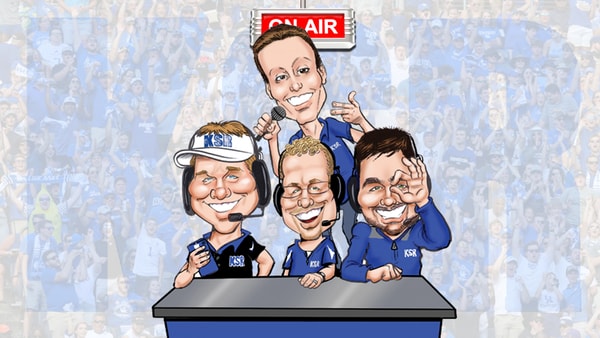
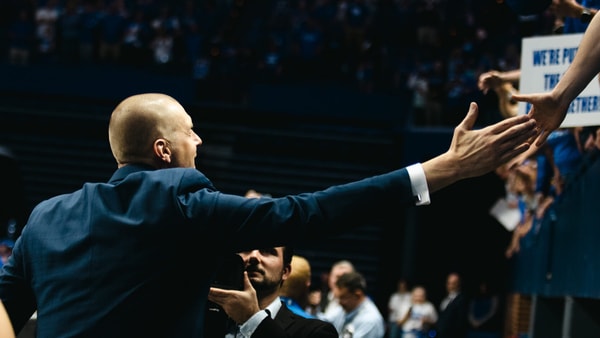
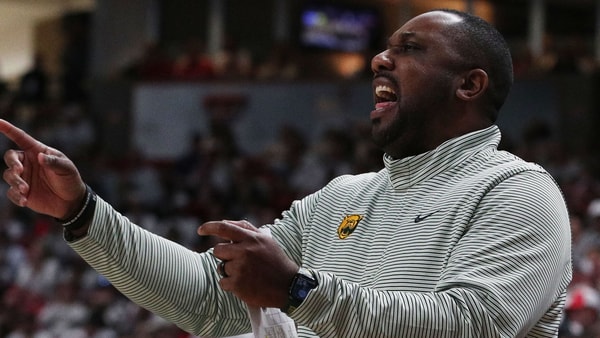
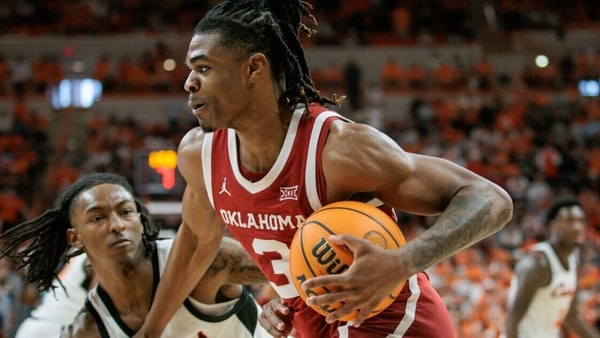
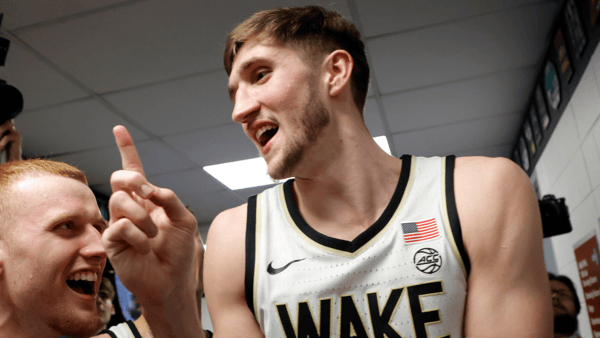
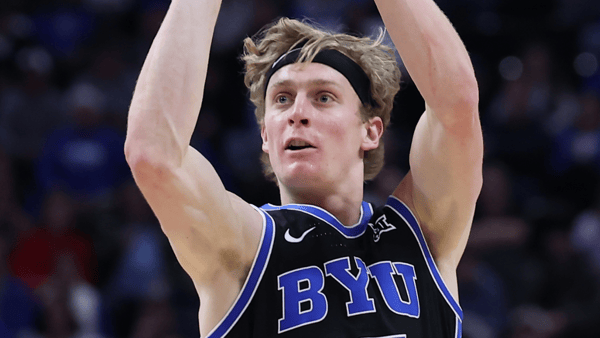
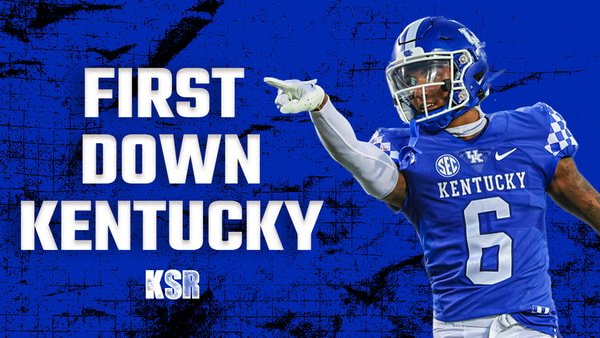
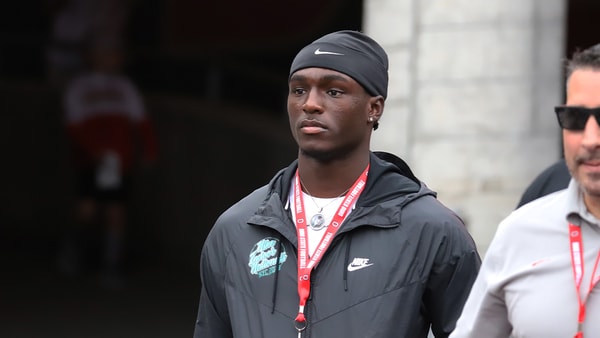
Discuss This Article
Comments have moved.
Join the conversation and talk about this article and all things Kentucky Sports in the new KSR Message Board.
KSBoard